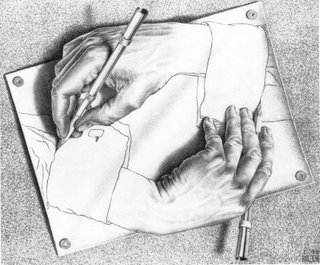Eucharist and the Redemption of Time
I write this post in response to a recent conversation about the 'emerging church' in the West. At the outset, I must admit that this phenomenon is only hearsay for me. Far from ever attending an emergent service, I have never even read anything by Brian McLaren. However, I did once hear Rob Bell give a talk. Still, at this point I am quite ambivalent about what is being called the emerging church. While I do not intend this polemically, I just don't know in what sense it is a church and what it is emerging from. My recent conversation did little to help me in this regard.
In this discussion, I heard about a group of Christians in a suburban area who desired authentic community while continuing to engage their secular neighbors. They comprised a loosely organized amalgam of small home churches who decided to meet regularly each month as a combined fellowship. To their credit, they did not attempt to create a community ex nihilo; instead, they drew upon the liturgies of the Church (particularly the Anglican version) when they met jointly. Nevertheless, I think this well-intentioned bunch seriously failed in one respect: they relegated the Eucharistic celebration to two observances per month, even though they meant to worship together more often.
Why is this so important? Before building my case for the centrality of Eucharist in Christian worship, let me start by clarifying a few issues with the sacraments. First, the sacraments are not about controlling the masses through ritual, multiplying canon law, and solidifying the authority of a human hierarchy. As instruments in God's hand, the use of sacraments is a channel of grace. Yet, performed insincerely, legalistically, or perniciously, the practice of sacramentalism is obviously a stumbling block.
Second, the sacraments are not about human efforts to gain God's favor. As any sacramental theology must admit, God is not bound by the sacraments; He bestows grace on His elect, whom He has predestined. Nevertheless, if Christians believe that the Word became flesh in order to save humanity, it is fitting for them to receive this salvation by a union of word and flesh, the visible signifying the invisible. This sacramental response to God incarnate was instituted by the Divine Man as a way to perfect human worship of a mysterious God. For us to willfully ignore the sacraments robs us of the grace He makes available so readily, and it begs the question: Why do we worship?
I do not intend an exhaustive treatment of this question here. I only hope to provide a sketch of what must constitute a sine qua non of Christian worship. In order to correctly approach the phenomenon of worship, it is necessary to do some archeology, uncovering what modern culture has buried. For, worship is properly situated between a subject and a king. More to the point, worship is the constitutive act of the subject with respect to the sovereign. What this means is that, apart from worship, the king does not have a kingdom. And, whenever subjects offer worship, they are not merely signifying, but enacting the king's sovereignty. Two conclusions follow: First, subjects know who they are based on whom they worship. Second, in the perfect act of worship, the subject and sovereign are united in the reality of the kingdom being fulfilled in their midst.
Now it becomes clear why the Eucharist is the central act of Christian worship. In the sacrifice of the altar, Christ makes Himself available to us as the only offering suitable to the Father. What is more, by feasting at this table, we celebrate Christ's victorious kingship as He unites Himself to us, and as each of us is united to the others by His Spirit. Thus, the Church (inasmuch as it is Christ's kingdom on earth) is most fully manifest when it communes in the Eucharist.
For this reason, a community of Christians who gather for corporate fellowship and claim to take the sacramental tradition seriously should not neglect to celebrate around the Lord's table. Still, having argued for the importance of Eucharist, the original problem remains: How often should Christians practice it?
To respond to this question, one must inevitably utilize some measure of time, whether day, week, month, year. So, another quandary arises. How ought Christians to measure time?
As we mark experiences in our lives, the way we measure time has an impact on our souls, often a subtle influence but for that reason very insidious. Note how people are generally more cheerful on Fridays, stressed at the beginning of a month, festive at the new year, morose at the beginning of April, or what have you. Especially within modern society, time consciousness is a tool for disciplining political and economic subjects to be more pliable and efficient citizens/consumers. Thus, the calendar is not an indifferent structure for organizing life; it affects what we think about and what we value. This is one reason why Jews and Muslims retain their own dating systems. If Christians are concerned about engaging their culture for Christ, they must not focus merely on spatial constructs (neighborhoods, cities, schools, businesses). They must revive an awareness of Christ's kingdom as a temporal reign, one which transforms our very experience of life's flow.
The traditional way of embodying Christ's kingship in time was not merely to devise a calendar with different dates. More than this, Christians through the ages have intetionally re-narrated their lives in terms of Christ's own story, effectively redeeming our measures of time, marking every day as a day under the reign of Christ. In this way, nature's seasons give way to liturgical seasons, each year recalls a new advent, epiphany, temptation, passion, resurrection, ascension and pentecost. Likewise, monks used to intone the Psalter on a montly cycle, renewing their songs to the Lord with each new moon. And, for its most important feast of all, the Church set aside each week as a memorial to Christ's passion with its culmination on Sunday.
The symbolism of a weekly feast is apropo given the historical meaning of the weekly cycle. Rather than basing time on the motions of bodies (with its pagan tendencies), the idea of a seven-day period, according to its biblical origin, signified God's intimate relation to the world as its Creator. And now, for those in Christ's kingdom, the resurrection means that there is a sense in which every week is a Holy Week, every Thursday is a passover, every Friday good, every Saturday we wait expectantly, every Sunday we are surprised by abundant grace. We now live beyond the original creation and are witnesses to God's new creation in Christ Jesus.
As witnesses to this reality, we must engage our culture in every aspect that would deny Christ's victory. This entails not only spatial awareness, but a temporal consciousness, too. Christ is not only King at home, at work, and in schools; He is also Lord over the second, the minute, and the hour. Lest we forget this or the world ignore it, Christians proclaim this truth every week when they remember the new life offered through God's Paschal Lamb. In this light, intentionally forgoing an opportunity to celebrate and enact our birth as a new people is more than naive; it begs one to wonder whether Christ claims our full allegiance, or whether we are content to live another week under the dominion of secular time.


